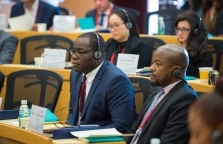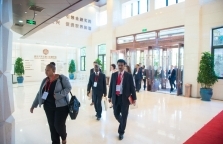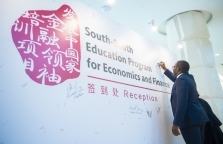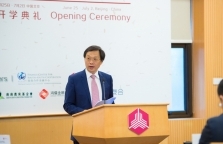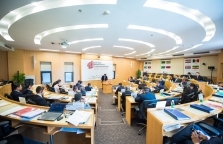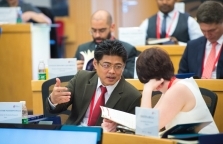On June 26th, 2017, the second “South-South Education Program for Economics and Finance” was launched in the PBC School of Finance, Tsinghua University (PBCSF), Beijing. The program has attracted senior government officials, bank executives and influential enterprises’ CEOs from 24 developing countries to fully participate in the one-week program.
Under the framework of South-South cooperation and “Belt-and-Road”, the Program aims to facilitate policy coordination and experience sharing among developing countries, enhance the bilateral and multilateral cooperation between China and other countries, and build the platform and bridge for financial integration in the Global South.
In the next seven days, other than classroom learning, the program participants will have the opportunity to visit the Bank of China, China Development Bank, Silk Road Fund, Asia Infrastructure Investment Bank and the Export-Import Bank of China. In addition, they’ll also go on a field trip to one of China’s leading industry city operators, the China Fortune Land Development Co., Ltd. This training program is co-organized by the Finance Center for South-South Cooperation (FCSSC) and PBCSF, and sponsored by the South South Education Foundation (SSEF), the Hongru Financial Education Foundation and China Taihe Group.
The Opening Ceremony was hosted by Dr. Wu Zhong, Vice President and Director-General of FCSSC and SSEF. Dr. Yang Bin, Vice President of Tsinghua University, Mr. Cai E’sheng, Chairman of FCSSC and SSEF, Prof. Liao Li, Executive Associate Dean of PBCSF, Mr. Xu Junhua, Chairman of Hongru Financial Education Foundation and Mr. Wang Renguo, Chairman of the Board of China Taihe Group, also attended the ceremony.
Dr. Yang Bin expressed his warm welcome to the participants from worldwide, and made a brief introduction of Tsinghua University. “We’re now living in a challenging world that the global economic development may need new impetus and the development should be more inclusive and balanced, which will help to narrow the wealth gap,” said Dr. Yang. “On one hand, when China is dealing with its sustainable development, it should actively promote mutual improvement with others through enhanced cooperation, and facilitate the global economic development to become more balanced and sustainable, so as to fulfill the shared mission of the world. On the other hand, China may devote to contributing to regional economic cooperation and enhancing the concrete collaboration with the emerging market and developing countries. As one of the best universities in China, Tsinghua is duty bound to join that effort.”
Chairman Cai said that within the framework of “Belt-and-Road” Initiative, the program successfully combined cultural exchange with financial cooperation and invited Chinese scholars and bankers to share China’s experience of financial reform, which contributed to facilitate collaboration and communication among countries of the Global South. As a non-profit international organization registered and founded in Hong Kong, the FCSSC specializes in production capacity cooperation, development experience exchange and financial services, and has been in Special Consultative Status with ECOSOC of the United Nations since April 2017. Particularly, Chairman Cai mentioned that last year’s program participants had created their WeChat group to stay in touch, and he hoped this year’s participants could also make friendship with them, for the purpose of building a global alumni network of financial leaders.
Prof. Liao Li pointed out the obstacles that developing countries were facing. “The difficulties in the process of developing countries’ further development, have been linked with the world economic growth and therefore gained global attention. The most urgent obstacles faced by developing countries are debt and short of funds, while the current international economic environment and financial system cannot tackle them. Thus it’s time to resort to South-South financial cooperation to improve the international economic environment, because that cooperation has been proved to be an effective way to enhance collective self-sufficiency since the post-war era.” Prof. Liao further expressed PBCSF’s willingness to make contributions to that course.
Mr. Xu Junhua expressed his hope to help participants broaden their visions, absorb new knowledge and learn from China’s development experience through this training program, hence support participants in leading their countries’ economic construction and promote economic development in the Global South. “Hongru aims to support China’s financial education, build financial think tanks and practice social welfare, and will continue to promote a more balanced financial development in the world and make contributions to those underdeveloped areas,” Mr. Xu added.
As a representative of participants from China, Mr. Wang Renguo described his vision of Chinese entrepreneurs seeking transformation and overseas cooperation in the new era. China Taihe Group is a financial conglomerate focusing on the coordinated development of finance, health, culture and tourism, real estate, education and agriculture. The company is committed to working with South-South countries to establish a complete financial solution.
After the opening ceremony, Dr. Jiao Jinpu, Chairman of Shanghai Gold Exchange and former Director-General of the Financial Consumer Protection Department of the People’s Bank of China, taught the first class with the theme of “China’s Financial Reform and Inclusive Finance”, which introduced China’s financial system and the burgeoning inclusive finance in detail. The participants raised lots of questions and interacted actively with the teacher in the classroom.
On the evening of June 26th, the program also held a Welcome Dinner in Beijing. Madam Wu Xiaoling, Vice Chairwoman of the Financial and Economic Affairs Committee of the Congress and Dean of PBCSF, Mr. Zhang Zhiping, Executive President of FCSSC and Vice President of SSEF, Madam Li Xiulan, Secretary-General of Hongru Financial Education Foundation and other related figures attended the event and welcomed the participants from 24 developing countries. The organizers also invited alumni from PBCSF EMBA to the dinner to talk with program participants on topics ranging from current global economic situation, China’s development experience to the development potential of the Global South and investment opportunities. The “South-South Education Program for Economics and Finance” will continue to be practical and facilitate mutual trust, so as to build the civil bridge for cultural exchange and vision sharing between China and South-South countries.

